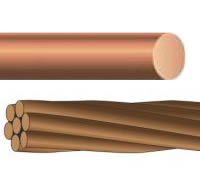
Copper has become synonymous with electrical wiring. Whether braided or solid strand, most types of wiring used in electrical applications are made of this reddish metal. The average home in the United States, in fact, contains nearly 200 pounds of copper wiring. Considering that there are other metals available, however, you might be wondering why copper is the preferred choice for wiring.
Conductivity
One of the main reasons copper is used in electrical wiring is conductivity. Copper is the second-most conductive metal on the planet, surpassed only by gold. Conductivity is a measurement of how much resistance electrons encounter as they travel through a given material. Highly conductive materials like copper create less resistance for electrons. Electricity can easily flow through conductive materials, resulting in better performance for electrical applications.
Flexible
Copper is flexible — even more so than other metals like aluminum. You can bend copper wiring around corners without fear of it breaking. Thanks to its superior flexibility and malleability, copper wiring will retain its conductive properties while providing a reliable conduit for electricity.
Inexpensive
Another reason copper is used for electrical wiring is the price. While prices fluctuate according to market trends, copper costs less than other conductive metals. Gold, for instance, is more conductive than copper, but it also costs more than copper. With its conductive properties and inexpensive price tag, copper wiring is typically preferred over gold.
Low CTE
Copper has a low coefficient of thermal expansion (CTE). Why does this matter? CTE is a measurement of how much a material expands in response to heat. As materials heat up, they tend to expand. Copper, however, has a lower CTE than many other metals. Even when it heats up, it will retain much of its original size.
Resistant to Corrosion
Copper offers excellent resistance to corrosion. It can withstand moisture and humidity with little or no degradation. Other metals lack the corrosion-resistant properties of copper. Steel and other iron alloys, for example, are often susceptible to corrosion. When exposed to moisture or humidity, they will undergo a chemical process known as oxidation that ultimately leads to corrosion.
Safety
Copper wiring is safe. It has a high melting point that, when combined with its corrosion-resistant properties, makes it a safe choice for commercial and residential electrical applications alike. There are also standards for copper wiring. These standards ensure a high level of electrical performance and an equally high level of safety with copper wiring.
